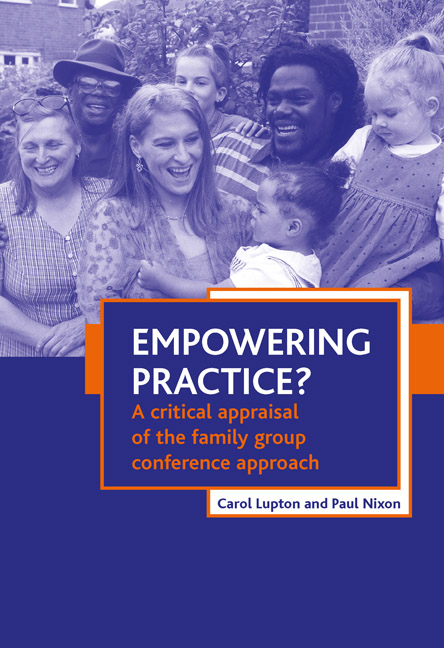Book contents
- Frontmatter
- Contents
- Preface
- Acknowledgements
- Introduction
- one The dilemmas of empowerment
- two Partnership and empowerment in children’s services
- three Lessons from New Zealand
- four Empowering professionals?
- five International perspectives
- six Empowerment in process?
- seven Assessing outcomes in child welfare
- eight Empowering outcomes?
- nine Conclusion
- Bibliography
- Index
one - The dilemmas of empowerment
Published online by Cambridge University Press: 05 July 2022
- Frontmatter
- Contents
- Preface
- Acknowledgements
- Introduction
- one The dilemmas of empowerment
- two Partnership and empowerment in children’s services
- three Lessons from New Zealand
- four Empowering professionals?
- five International perspectives
- six Empowerment in process?
- seven Assessing outcomes in child welfare
- eight Empowering outcomes?
- nine Conclusion
- Bibliography
- Index
Summary
Introduction
Fundamentally, [the Children, Young Persons and their Families Act] is a change of statute law that incorporates procedures for empowering the families … of ‘at risk’ children, to be able to work out and implement their own plans for the enhancement of the welfare of their own children. (Wilcox et al, 1991, p 1)
As the above quotation indicates, one of the explicit aims of the legislation behind the New Zealand family group conference (FGC) is the ‘empowerment’ of families within the childcare decision-making process. Not only is it believed that the FGC approach will empower family members by affording them greater control over decisions about the care and protection of their children, but it is also assumed that the particular way in which such decisions are made within the FGC approach will, in itself, empower those who take part:
The reciprocity evident in the family group conference process helps emphasise the point that people can benefit from the challenge and opportunity of helping others. Receiving help can actually weaken one's self esteem, but giving help as well as receiving it can empower people and strengthen their sense of self worth. (Hudson et al, 1996, p 3)
In this way the FGC approach can be seen to fit snugly with the growing preoccupation of UK social policy discourse over the 1990s with citizen-consumer involvement in public service development and provision. Described variously as “… the buzz word of the 1980s” (Adams, 1990, p 42) or the “theme for the 1990s” (Clarke and Stewart, 1992, p 18), the idea of ‘user empowerment’ rapidly achieved political prominence over these years, securing official approval in the guidance to the National Health Service and Community Care legislation: “the rationale for this reorganisation is the empowerment of users and carers” (DoH/SSI, 1991, p 7). The popularity of the idea of empowerment in large part resulted from its attractiveness to political groups of the Left and Right alike. In the context of social welfare, for example, it played a central role in the language of user groups pressing for more control over State services but was also a key theme in the literature of New Right theorists, concerned with freeing the individual from unnecessary interference by, or dependence upon, those services.
- Type
- Chapter
- Information
- Empowering Practice?A Critical Appraisal of the Family Group Conference Approach, pp. 7 - 30Publisher: Bristol University PressPrint publication year: 1999



